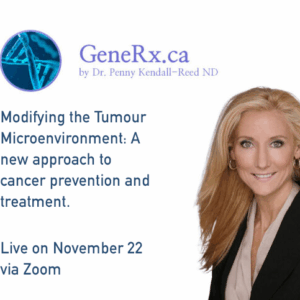
Now available for VOD purchase
Modifying the Tumour Microenvironment: A new approach to cancer prevention and treatment.
Cancer is the second leading cause of death in North America. The number of new cancer cases diagnosed annually is expected to grow by more than 75% by 2050. Cancer rates for individuals under 50 have been growing at 1-2% per year. More importantly, the aggressiveness of tumours seems to be increasing. In part, this is due to excessive stimulation of cellular proliferation pathways (PI3K and mTOR) resulting in DNA mutations, particularly p53, within healthy and cancerous cells, which affects both response and resistance to treatment.
A genetic Guide to Psychological Treatment.
Over 23% of North Americans are pharmacologically medicated for a mood disorder, yet 40% of these people do not respond their treatment. Furthermore, 86% of people on
mood stabilizers report at least one major side effect. Why are these statistics so high?
Enhancing Autophagy Through Genetics: why individual rates vary and how to alter them to minimize disease risk.
Autophagy is the body’s natural self-preservation mechanism for removing damaged or dysfunctional components within cells and recycling them for cellular repair. In doing so, it prevents DNA mutation and cellular damage that can lead to a variety of disease such as neurodegenerative disease, stroke, cancer and type II diabetes. In this lecture we will take a close look at the importance of autophagy and why so many people have difficulty accessing this important mechanism, even with fasting mimicking diets. You will learn how to use the GeneRx report to discover…
Hypertension: Why is it so common and so poorly treated? Let genetics guide your management.
48% of adults in North America have clinically diagnosed hypertension. This number reaches 70% for adults over 60 and treatment most often requires 2 or more medications. Triggers for high blood pressure are numerous and include unhealthy eating, stress, insomnia, sleep apnea, kidney disease, vascular disease, inflammation and high aldosterone, all of which make targeted treatment difficult. In this video I will review triggers for high blood pressure and the genes that play a role in its development. I will explain how to use the GeneRx report to accurately target…







